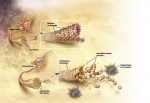 Who would have thought that there is a “silver lining” in having Skin Cancer? Skin cancer may be an indication that you are less likely to develop Alzheimer’s Disease. This finding comes from a study published this month in Neurology®, which found that found that its subjects were 80 percent less likely to develop Alzheimer’s Disease if they had non-melanoma skin cancer.
Who would have thought that there is a “silver lining” in having Skin Cancer? Skin cancer may be an indication that you are less likely to develop Alzheimer’s Disease. This finding comes from a study published this month in Neurology®, which found that found that its subjects were 80 percent less likely to develop Alzheimer’s Disease if they had non-melanoma skin cancer.
The study followed 1,102 subjects over the age of 70 who did not have any form of dementia when it began. Over the course of the study, in which subjects participated for an average of 3.7 years, some of them developed dementia and some developed skin cancer (and some reported having had skin cancer before the study began). Of the 141 patients who had skin cancer, only two also developed Alzheimer’s Disease.
Crucially, this negative correlation was found specifically between non-melanoma skin cancers (squamous cell carcinoma and basal cell carcinoma) and Alzheimer’s Disease (and not other types of dementia).
The reason for this inverse relationship is not yet known, but the study’s authors speculate that it may be the result of a confluence of genetics and lifestyle choices. For example, people who get more exercise are less likely to develop Alzheimer’s Disease, as shown by previous studies. People who exercise are also likely to accumulate more exposure to ultraviolet light, which is a primary risk factor for skin cancer. So an active lifestyle may be a linking factor in the relationship between Alzheimer’s Disease and skin cancer, but it cannot be the whole story. The problem with this hypothesis is that exercise also protects against vascular dementia, another form of brain degeneration, yet a similar relationship between skin cancer and vascular dementia has not been found.
Another possible explanation comes from genetics. Our individual genetics may give our cells a tendency to either divide and multiply—as happens out of control in cancer—or to die off as occurs with brain tissue in Alzheimer’s patients. This hypothesis is interesting because both brain and skin cells are derived from the same type of stem cells.
The genetic explanation is particularly interesting because it would offer predictability about one’s risk factors for skin cancer or Alzheimer’s Disease. Furthermore, a biological explanation for why these diseases seem to exclude each other could possibly lead to preventative measures for either of these serious illnesses.
Of course, there is the possibility that a factor only indirectly related to either skin cancer or Alzheimer’s Disease is causing an apparent correlation. Even if a biological factor were discovered, it may not have any applications as a medical treatment. More research is needed to find out. See the below reference and link to find out more.
- American Academy of Neurology (AAN). “Skin cancer may be linked to lower risk of Alzheimer’s disease.” ScienceDaily, 15 May 2013. Web. 23 May 2013.
 Who would have thought that there is a “silver lining” in having Skin Cancer?
Who would have thought that there is a “silver lining” in having Skin Cancer?  The U.S. Preventative Services Task Force (USPSTF) recommends counseling to children and young adults (ages 10-24) with fair skin on the effects and dangers of ultraviolet (UV) light exposure.
The U.S. Preventative Services Task Force (USPSTF) recommends counseling to children and young adults (ages 10-24) with fair skin on the effects and dangers of ultraviolet (UV) light exposure.
